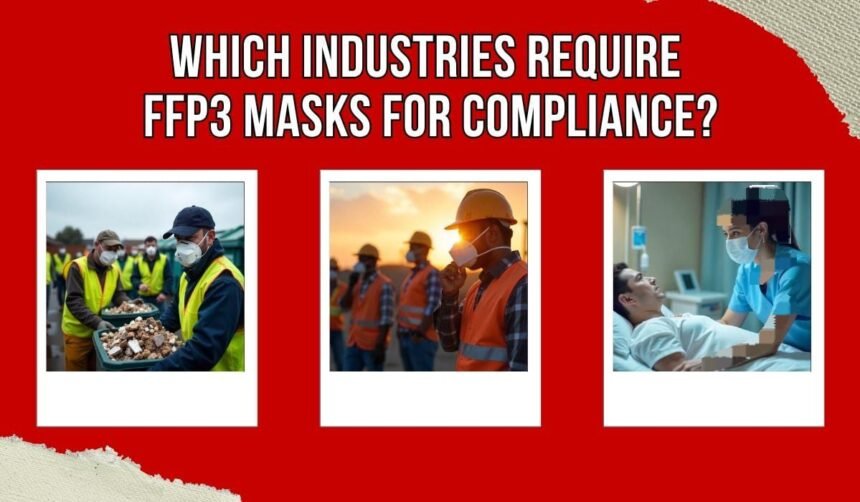With the toxicity level increasing in the environment, especially in certain workplaces like construction and mining, protecting your respiratory system is crucial. It’s important to exercise caution and take precautions, especially if you work in a critical area prone to airborne hazards. The best face masks for filtering airborne particles are FFP3 models, which filter at least 99 percent of the air’s minute particles.
Do you require an FFP3 for our profession? We will guide you through the list of industries that require the integration of FFP3 masks for compliance.
But First: What is an FFP3 mask?
Respirator masks are ranked according to their filtration efficiency using the FFP (Filtering Face Piece) classification. FFP3 masks are at the highest protective class in this series of categories. The multi-layered fibrous filter in these form-fitting masks is intended to trap 98% of particles. Thorough testing promises that FFP3 masks fulfil requirements for breathability and filtration efficiency. Here’s what you need to know:
- The tight-fitting form of the mask effectively seals the face for optimal protection.
- In high-risk settings with high levels of dangerous dust, mists, or aerosols, you can wear an FFP3 powered respirator.
- The FFP3 mask has a filtration efficiency of 98% for up to 0.3 microns particles. It has the highest protection limits, with APF being 20x and OEL being 50x. APF indicates the factor by which the wearer is protected, and OEL means how hazardous an environment the mask can withstand and filter the air efficiently.
These masks, however, are not impervious to gas or vapour threats. So, you must replace FFP3 masks at the suggested time and always adhere to the manufacturer’s instructions.
What makes FFP3 dust masks better than others?
It’s important to comprehend why consumers prefer FFP3 dust masks above other varieties before choosing them for your industry:
- Better Protection:Compared to standard surgical masks, this protection against airborne viruses is far more dependable.
- Improved Fit and Seal:Reduces leakage in comparison to conventional throwaway face masks.
- Comfort for Extended Use:Features such as exhalation valves make breathing easier.
- Broad Range of Uses:Fit for personal safety, industrial tasks, and healthcare.
Top Industries Requiring FFP3 Masks for Compliance
More exposure to hazardous particles, stricter workplace safety laws, and awareness of respiratory safety are the key factors driving the growing need for the best dust masks. Diverse industries use the FFP3 masks to protect their employees’ health and maintain regulatory compliance. Here’s a checklist of industries that often require an FFP3 mask for compliance.
- Healthcare
FFP3 may be necessary for healthcare professionals, particularly those who deal high-risk procedures, especially during aerosol generating procedures, like intubation, bronchoscopy, tracheotomy, and cardiopulmonary resuscitation. The FFP3 masks’ ability to effectively seal the healthcare worker’s face is ensured via fit testing. A poor seal could expose the healthcare provider to infectious diseases and jeopardize the safety of the individuals they are treating.
- Oil and Gas
Numerous jobs and working conditions in the oil and gas sector may expose employees to potentially hazardous gases, fumes, and particles. Hence, FFP3 masks is the best respiratory mask that provides the necessary protection.
Mask fit testing, especially for FFP3, is frequently necessary for oil and gas employees. A proper fit ensures an effective seal between the mask and the wearer’s face. It minimises the risk of exposure to hazardous airborne substances such as toxic gases, vapours, and fine particulate matter commonly present in oil and gas environments.
- Construction
Workers in the construction sector are exposed to asbestos, silica dust, wood dust, welding fumes, and other dangerous materials. Depending on the material being handled, FFP2 and FFP3 masks are often used. Since asbestos is poisonous, the FFP3 mask asbestos masks are needed when handling it.
- Industrial and Manufacturing Work
Workers in manufacturing settings are often exposed to fumes, vapours, and fine particles. Masks with specific filtering qualities, such as FFP3 or respirators with gas filters, are necessary for workers handling poisonous substances or dangerous gases.
- Stonemasons
Stonemasons also require the FFP3 masks if the job exposes them to airborne contaminants like dust, silica particles, or other substances that could endanger their respiratory health. Such respirators or FFP3 dust masks effectively seal the stonemason’s face and offer sufficient protection.
- Public Use
Masks like FFP2 and FFP3 were widely used for general purposes during the COVID-19 epidemic. They work well to stop the spread of infectious pathogens in public areas, but they are not appropriate for industrial protection.
However, FFP2 and FFP3 masks with valves are not suitable for public use because the exhaled air by the wearer remains unfiltered. So, if the wearer unknowingly has COVID-19, then it can be transmitted to the other person through the exhaled air. Hence, it is best to prefer FFP2 and FFP3 without valve masks in public use.
Summing Up
It is simply not an option to compromise on respiratory protection in dangerous conditions, especially if it’s a workplace. FFP3 face masks offer the best protection for your lungs. Selecting powered respirators and a certified FFP3 dust mask or a full-face mask guarantees adherence to strict safety regulations. You are protected from small airborne particles by their exceptional 99% filtration efficiency.
FFP3 masks from reliable suppliers like Respirator Shop are the best option when your job requires the highest level of respiratory protection. With our range of FFP3 products, you can priorities regulatory compliance while investing in your health. Keep yourself and your employees safe to be productive at work today!









